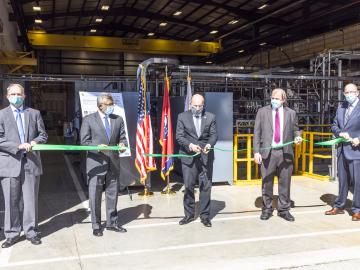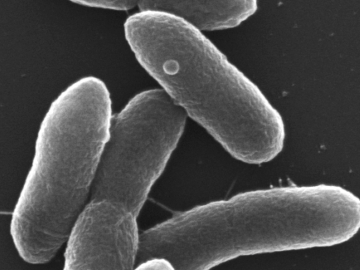
Filter News
Area of Research
- Advanced Manufacturing (2)
- Biological Systems (1)
- Biology and Environment (43)
- Computational Biology (1)
- Computational Engineering (1)
- Energy Science (56)
- Fusion and Fission (27)
- Fusion Energy (8)
- Isotope Development and Production (1)
- Isotopes (8)
- Materials (23)
- Materials for Computing (4)
- National Security (6)
- Neutron Science (23)
- Nuclear Science and Technology (19)
- Quantum information Science (1)
- Supercomputing (54)
News Type
News Topics
- (-) Advanced Reactors (24)
- (-) Biomedical (59)
- (-) Coronavirus (36)
- (-) Frontier (60)
- (-) Fusion (54)
- (-) Mathematics (8)
- (-) Space Exploration (16)
- 3-D Printing/Advanced Manufacturing (104)
- Artificial Intelligence (112)
- Big Data (53)
- Bioenergy (93)
- Biology (106)
- Biotechnology (35)
- Buildings (45)
- Chemical Sciences (70)
- Clean Water (18)
- Composites (23)
- Computer Science (174)
- Critical Materials (16)
- Cybersecurity (31)
- Education (5)
- Element Discovery (1)
- Emergency (3)
- Energy Storage (75)
- Environment (154)
- Exascale Computing (64)
- Fossil Energy (7)
- Grid (48)
- High-Performance Computing (113)
- Hydropower (6)
- Isotopes (53)
- ITER (6)
- Machine Learning (50)
- Materials (111)
- Materials Science (111)
- Mercury (9)
- Microelectronics (4)
- Microscopy (40)
- Molten Salt (5)
- Nanotechnology (46)
- National Security (78)
- Neutron Science (136)
- Nuclear Energy (94)
- Partnerships (67)
- Physics (60)
- Polymers (22)
- Quantum Computing (48)
- Quantum Science (79)
- Security (28)
- Simulation (52)
- Software (1)
- Statistics (3)
- Summit (62)
- Transportation (56)
Media Contacts

Popular wisdom holds tall, fast-growing trees are best for biomass, but new research by two U.S. Department of Energy national laboratories reveals that is only part of the equation.

Momentum Technologies Inc., a Dallas, Texas-based materials science company that is focused on extracting critical metals from electronic waste, has licensed an Oak Ridge National Laboratory process for recovering cobalt and other metals from spent

Department of Energy Under Secretary for Science Paul Dabbar joined Oak Ridge National Laboratory leaders for a ribbon-cutting ceremony to mark progress toward a next-generation fusion materials project.

Four research teams from the Department of Energy’s Oak Ridge National Laboratory and their technologies have received 2020 R&D 100 Awards.

The combination of bioenergy with carbon capture and storage could cost-effectively sequester hundreds of millions of metric tons per year of carbon dioxide in the United States, making it a competitive solution for carbon management, according to a new analysis by ORNL scientists.

Prometheus Fuels has licensed an ethanol-to-jet-fuel conversion process developed by researchers at Oak Ridge National Laboratory. The ORNL technology will enable cost-competitive production of jet fuel and co-production of butadiene for use in renewable polymer synthesis.

ORNL scientists have modified a single microbe to simultaneously digest five of the most abundant components of lignocellulosic biomass, a big step forward in the development of a cost-effective biochemical conversion process to turn plants into

Radioactive isotopes power some of NASA’s best-known spacecraft. But predicting how radiation emitted from these isotopes might affect nearby materials is tricky

Experts at the Department of Energy’s Oak Ridge National Laboratory are now offering short-term technical and scientific assistance to entities working to combat the coronavirus through the COVID-19 Technical Assistance Program, an initiative of DOE’s Office of Technology Transitions.

The Department of Energy announced awards for 10 projects with private industry that will allow for collaboration with DOE national laboratories in accelerating fusion energy development.


